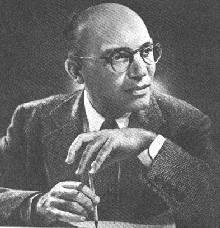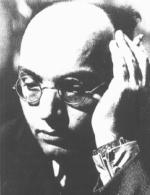Kurt Weill (1900-1950)
(born Dessau, 2 March 1900; died New York, 3 April 1950).
German composer, American citizen from 1943.
 He
was a pupil of Humperdinck, Busoni and Jarnach in Berlin (1918-23); their
teaching informed his early music, including the choral Recordare
(1923) and the Concerto for violin and wind (1924), the latter also influenced
by Stravinsky. But the deeper influence of Stravinsky, coupled with an
increased consciousness of music as a social force, led Weill to a rediscovery
in the mid-l920s of tonal and vernacular elements, notably from jazz, in
his cantata Der neue Orpheus and one-act stage piece Royal Palace,
written between two collaborations with the expressionist playwright Georg
Kaiser: Der Protagonist and Der Zar lässt sich photographieren.
In 1926 he married the singer Lotte Lenya, who was to be the finest interpreter
of his music.
He
was a pupil of Humperdinck, Busoni and Jarnach in Berlin (1918-23); their
teaching informed his early music, including the choral Recordare
(1923) and the Concerto for violin and wind (1924), the latter also influenced
by Stravinsky. But the deeper influence of Stravinsky, coupled with an
increased consciousness of music as a social force, led Weill to a rediscovery
in the mid-l920s of tonal and vernacular elements, notably from jazz, in
his cantata Der neue Orpheus and one-act stage piece Royal Palace,
written between two collaborations with the expressionist playwright Georg
Kaiser: Der Protagonist and Der Zar lässt sich photographieren.
In 1926 he married the singer Lotte Lenya, who was to be the finest interpreter
of his music.
 His
next collaborator was Brecht, with whom he worked on The Threepenny
Opera (1928), The Rise and Fall of the City of Mahagonny (1929)
and Happy End (1929), all of which use the corrupted, enfeebled
diatonicism of commercial music as a weapon of social criticism, though
paradoxically they have beome the epitome of the pre-war culture they sought
to despise. Yet this is done within the context of a new harmonic consistency
and focus. These works have also drawn attention from the theatre works
in which Weill developed without Brecht during the early 1930s, Die
Bürgschaft and Der Silbersee (with Kaiser again).
His
next collaborator was Brecht, with whom he worked on The Threepenny
Opera (1928), The Rise and Fall of the City of Mahagonny (1929)
and Happy End (1929), all of which use the corrupted, enfeebled
diatonicism of commercial music as a weapon of social criticism, though
paradoxically they have beome the epitome of the pre-war culture they sought
to despise. Yet this is done within the context of a new harmonic consistency
and focus. These works have also drawn attention from the theatre works
in which Weill developed without Brecht during the early 1930s, Die
Bürgschaft and Der Silbersee (with Kaiser again).
In 1933 he left Germany for Paris, where he worked with Brecht again
on the sung ballet The Seven Deadly Sins. Then in 1935 he moved
to the USA, where he cut loose from the European art-music tradition and
devoted himself wholeheartedly to composing for the Broadway stage, intentionally
subordinating aesthetic criteria to pragmatic and populist ones. Yet these
works are still informed by his cultivated sense of character and theatrical
form.
 He
was a pupil of Humperdinck, Busoni and Jarnach in Berlin (1918-23); their
teaching informed his early music, including the choral Recordare
(1923) and the Concerto for violin and wind (1924), the latter also influenced
by Stravinsky. But the deeper influence of Stravinsky, coupled with an
increased consciousness of music as a social force, led Weill to a rediscovery
in the mid-l920s of tonal and vernacular elements, notably from jazz, in
his cantata Der neue Orpheus and one-act stage piece Royal Palace,
written between two collaborations with the expressionist playwright Georg
Kaiser: Der Protagonist and Der Zar lässt sich photographieren.
In 1926 he married the singer Lotte Lenya, who was to be the finest interpreter
of his music.
He
was a pupil of Humperdinck, Busoni and Jarnach in Berlin (1918-23); their
teaching informed his early music, including the choral Recordare
(1923) and the Concerto for violin and wind (1924), the latter also influenced
by Stravinsky. But the deeper influence of Stravinsky, coupled with an
increased consciousness of music as a social force, led Weill to a rediscovery
in the mid-l920s of tonal and vernacular elements, notably from jazz, in
his cantata Der neue Orpheus and one-act stage piece Royal Palace,
written between two collaborations with the expressionist playwright Georg
Kaiser: Der Protagonist and Der Zar lässt sich photographieren.
In 1926 he married the singer Lotte Lenya, who was to be the finest interpreter
of his music.
 His
next collaborator was Brecht, with whom he worked on The Threepenny
Opera (1928), The Rise and Fall of the City of Mahagonny (1929)
and Happy End (1929), all of which use the corrupted, enfeebled
diatonicism of commercial music as a weapon of social criticism, though
paradoxically they have beome the epitome of the pre-war culture they sought
to despise. Yet this is done within the context of a new harmonic consistency
and focus. These works have also drawn attention from the theatre works
in which Weill developed without Brecht during the early 1930s, Die
Bürgschaft and Der Silbersee (with Kaiser again).
His
next collaborator was Brecht, with whom he worked on The Threepenny
Opera (1928), The Rise and Fall of the City of Mahagonny (1929)
and Happy End (1929), all of which use the corrupted, enfeebled
diatonicism of commercial music as a weapon of social criticism, though
paradoxically they have beome the epitome of the pre-war culture they sought
to despise. Yet this is done within the context of a new harmonic consistency
and focus. These works have also drawn attention from the theatre works
in which Weill developed without Brecht during the early 1930s, Die
Bürgschaft and Der Silbersee (with Kaiser again).